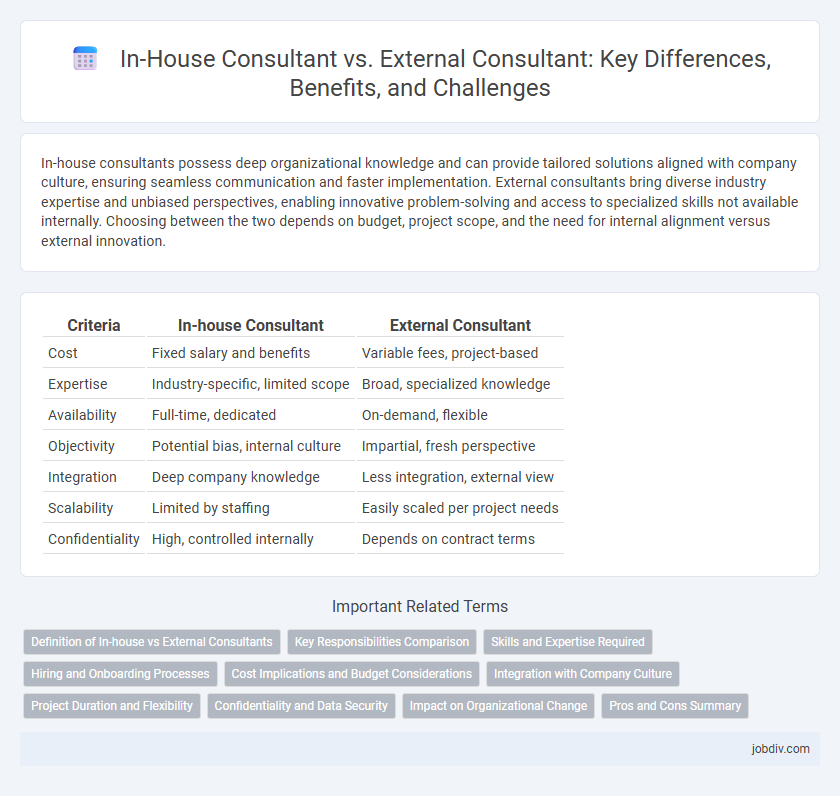In-house consultants possess deep organizational knowledge and can provide tailored solutions aligned with company culture, ensuring seamless communication and faster implementation. External consultants bring diverse industry expertise and unbiased perspectives, enabling innovative problem-solving and access to specialized skills not available internally. Choosing between the two depends on budget, project scope, and the need for internal alignment versus external innovation.
Table of Comparison
| Criteria | In-house Consultant | External Consultant |
|---|---|---|
| Cost | Fixed salary and benefits | Variable fees, project-based |
| Expertise | Industry-specific, limited scope | Broad, specialized knowledge |
| Availability | Full-time, dedicated | On-demand, flexible |
| Objectivity | Potential bias, internal culture | Impartial, fresh perspective |
| Integration | Deep company knowledge | Less integration, external view |
| Scalability | Limited by staffing | Easily scaled per project needs |
| Confidentiality | High, controlled internally | Depends on contract terms |
Definition of In-house vs External Consultants
In-house consultants are employees embedded within an organization, offering expertise tailored specifically to internal projects and ongoing operational needs. External consultants are independent professionals or firms contracted temporarily to provide specialized skills, objective analysis, and innovative solutions without long-term commitment. The distinction lies in employment status, with in-house consultants deeply integrated into corporate culture, while external consultants maintain autonomy and bring diverse industry perspectives.
Key Responsibilities Comparison
In-house consultants focus on aligning strategies with the company's culture and long-term goals, providing continuous support and deep organizational knowledge. External consultants deliver specialized expertise, offer objective analysis, and drive project-based solutions with flexibility across various industries. Both roles prioritize problem-solving but differ in access to internal resources and the scope of influence within the business.
Skills and Expertise Required
In-house consultants typically require in-depth organizational knowledge, strong internal stakeholder management skills, and expertise aligned with the company's core business processes. External consultants bring specialized skills, industry-wide best practices, and objective perspectives tailored to specific project needs or problem-solving scenarios. Both roles demand critical analytical abilities, effective communication, and adaptability to evolving business environments.
Hiring and Onboarding Processes
In-house consultants are integrated into company culture, resulting in streamlined hiring and onboarding processes with quicker adaptation to internal workflows and strategic goals. External consultants often require extensive onboarding to align with company-specific systems and may face delayed productivity due to limited access to proprietary knowledge and team integration. Organizations must evaluate time-to-productivity, cultural fit, and resource allocation when deciding between hiring internal consultants or engaging external consultancy firms.
Cost Implications and Budget Considerations
In-house consultants typically incur fixed costs such as salaries, benefits, and training, which can result in higher long-term expenses but offer greater control over budget allocation. External consultants often provide flexible billing options, including hourly rates or project-based fees, allowing organizations to manage short-term budget constraints more effectively. Evaluating the total cost of ownership, including indirect costs such as onboarding and integration, is crucial for optimizing consultancy investments.
Integration with Company Culture
In-house consultants possess a deep understanding of company values and workflows, facilitating seamless integration with organizational culture and promoting cohesive project outcomes. External consultants bring fresh perspectives but may require more time to align with the company's cultural norms, potentially impacting communication and collaboration efficiency. Companies prioritizing cultural congruence often prefer in-house consultants for long-term strategic initiatives, while external consultants are suited for specialized, short-term projects where rapid expertise deployment is critical.
Project Duration and Flexibility
In-house consultants typically offer greater flexibility and faster project initiation due to their deep understanding of internal processes and culture, making them ideal for long-term projects with evolving requirements. External consultants bring specialized expertise and an objective perspective, often suited for short-term or highly specialized projects where rapid impact is crucial. Project duration strongly influences the choice: in-house consultants excel in ongoing, flexible engagements, while external consultants deliver focused results within defined timelines.
Confidentiality and Data Security
In-house consultants provide heightened control over confidentiality and data security by operating within the company's secure IT infrastructure and adhering strictly to internal policies. External consultants may pose greater risks due to data transfer outside the organization and varying compliance with security protocols. Establishing comprehensive non-disclosure agreements (NDAs) and rigorous vetting processes is crucial to mitigate potential breaches when engaging external consultants.
Impact on Organizational Change
In-house consultants possess deep institutional knowledge, enabling them to drive organizational change with tailored strategies and sustained engagement. External consultants bring specialized expertise and unbiased perspectives that accelerate transformation but may face challenges in fully understanding company culture. Combining both in-house and external consultants often maximizes impact by leveraging internal insights and external innovation.
Pros and Cons Summary
In-house consultants provide deep organizational knowledge and quicker access for internal teams, enabling tailored solutions and consistent engagement. External consultants bring specialized expertise, diverse industry insights, and objective perspectives but often come with higher costs and less organizational familiarity. Balancing in-house consultants' ongoing availability and internal alignment against external consultants' flexibility and expert insights is crucial for optimized decision-making.
In-house Consultant vs External Consultant Infographic

 jobdiv.com
jobdiv.com